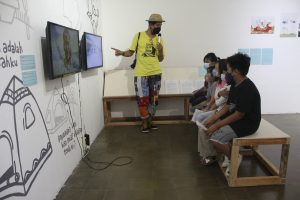“Cheer up!”
Decorated with colorful pictures, this simple sentence can be seen from the end of the postcard. This message, which is intended for children in the Kalideres refugee camp, seems naive. Guiltless. But, sincere at the same time.
Participated by participants of all ages, Jalin Sahabat #8 is a workshop that makes postcards for children. Held on Sunday (24/10), divided into two sessions, at 01.00 p.m and 03.00 p.m next to the main stage of the Jogja National Museum (JNM). This activity is part of the Biennale Jogja XVI Equator #6 2021 program.
 The activity began by inviting participants into the installation room of “A Pond is the Reverse of an Island” on the 1st floor. There was a wall plastered with postcards made by children in the Kalideres refugee camp, West Jakarta.
The activity began by inviting participants into the installation room of “A Pond is the Reverse of an Island” on the 1st floor. There was a wall plastered with postcards made by children in the Kalideres refugee camp, West Jakarta.
“Life is the flower, for which love is the honey.”
The writing and pictures of flowers on the side are full of innocence. Every scratch seems to hold hope amid their uncertain fate.
Anang Saptoto, a member of A Pond is the Reverse of an Island, explained that the postcards on the wall were intended for something abstract. For example, sending a message into the air or sending a wish to a star.
“At first I thought, where should the postcards made by the children in the refugee camp be sent? Jokowi? Anies Baswedan? Then, I suggest, what if sent to something abstract. It’s more poetic,” said Anang, explaining the postcard taped to the wall.
After observing the postcards, the workshop participants returned to the side of the JNM stage. They will reply to postcards from refugee children. Five workshop participants, aged kindergarten and elementary school, seemed enthusiastic about participating in the workshop.
Crayons and colored pencils were scattered around. Accompanied by their parents, they began to draw and write messages.
“This workshop is an entry point for them (the children) to speak, express opinions, and represent their thoughts by using pictures and writing methods,” explained Anang when talking about the purpose of this workshop.
Anang then said that this workshop started from the intangible needs of refugees, namely: psychology, knowledge, and education. From there, he used the homemade postcard method—a project he was working on—to fulfill that need.
It targets children as a vulnerable group within the refugee population. According to Anang, children have are always expected to always obey the adults’ decisions. However, they must have freedom of expression and opinion.